Key takeaways:
- Religious tolerance extends beyond coexistence to genuine respect and empathy for diverse beliefs, fostering acceptance through personal interactions and shared experiences.
- Religious education combats stereotypes and misinformation, promoting understanding through storytelling and dialogue, helping individuals to appreciate different traditions.
- Key concepts such as respect for diversity, coexistence, and empathy are vital in nurturing an environment where everyone feels valued, facilitating meaningful conversations that challenge prejudices.
- Strategies for promoting tolerance include open dialogues between faith groups, educational initiatives, and collaborative community service projects that unite individuals across different backgrounds.
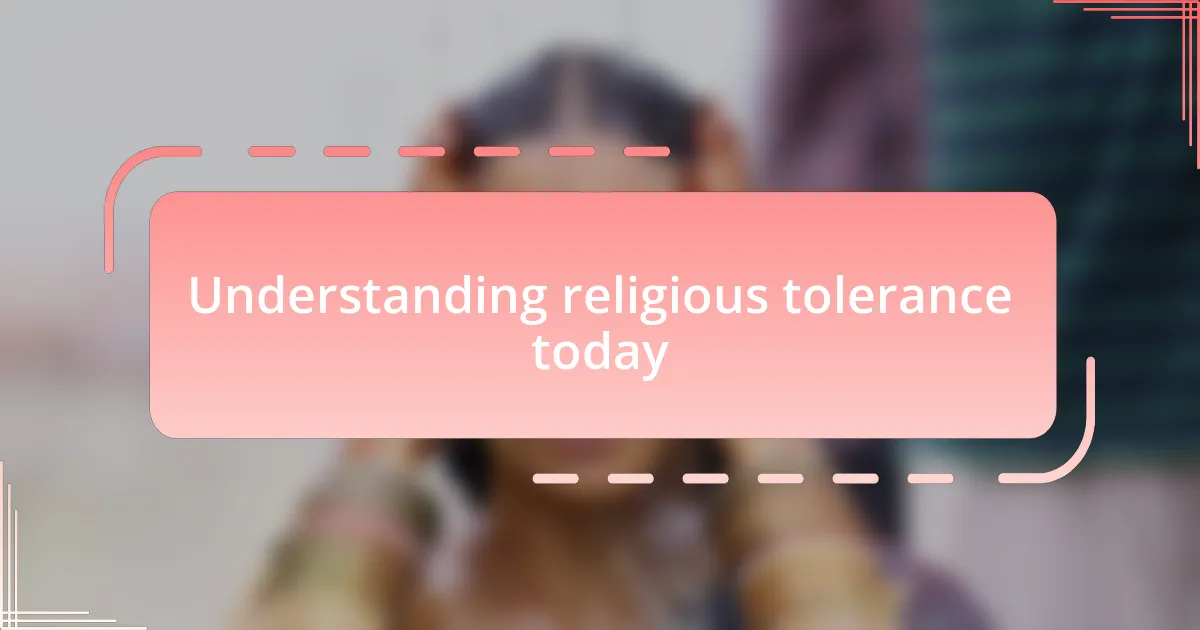
Understanding religious tolerance today
Understanding religious tolerance today is crucial in our increasingly diverse world. As I navigate different faiths through my community engagements, I often reflect on how vital it is to foster acceptance. Haven’t you felt the warmth of a shared meal among different backgrounds? It’s in these simple exchanges where I’ve seen the seeds of tolerance take root.
In my experience, religious tolerance is less about mere coexistence and more about genuine respect for each other’s beliefs. I remember attending a local interfaith dialogue that left a profound impression on me. Hearing personal stories from people of various faiths, I realized that despite our differences, we share fundamental values such as compassion and love. Isn’t it fascinating how these shared human experiences can bridge the gaps that often divide us?
Moreover, I’ve observed that today’s conversations around religious tolerance often intertwine with social justice issues. For instance, when advocates for equality articulate their struggles, it resonates deeply across faith lines. This connection prompts us to question: How can we stand up for one another in our fight for mutual respect? I believe it’s essential to cultivate empathy and understanding, helping us to appreciate not just the beliefs of others, but the rich tapestry of our collective humanity.
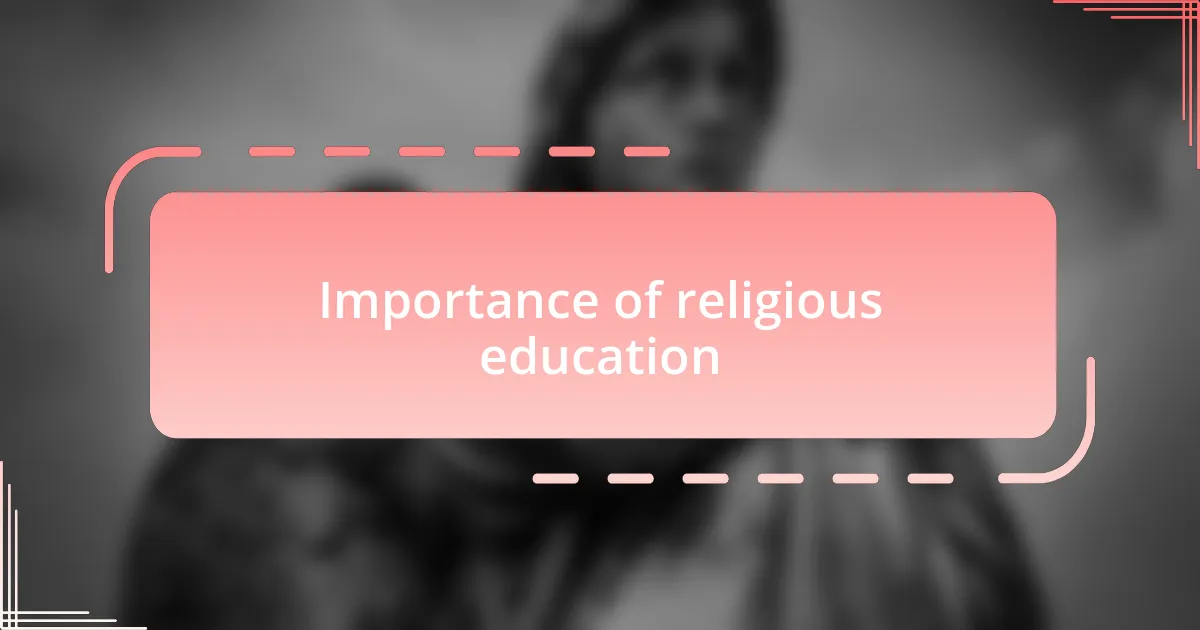
Importance of religious education
Religious education plays a pivotal role in cultivating understanding among individuals of different backgrounds. I recall a time when I attended a workshop on world religions, where our facilitator used storytelling to illustrate the core teachings of various faiths. This approach not only made the content relatable but also ignited in me a genuine curiosity about traditions I had little knowledge of. Have you ever had a moment when a story shifted your perspective? That’s the power of education.
Furthermore, religious education goes beyond mere facts and figures; it fosters critical thinking and empathy. During one discussion, a fellow participant shared their struggle with faith in the face of adversity. Listening to their journey made me reflect on how important it is to create safe spaces where individuals can explore their beliefs without fear of judgment. Isn’t it essential for us to learn how to support one another in our spiritual journeys?
In today’s world, religious education is key in combatting stereotypes and misinformation. I’ve seen how misconceptions can lead to fear and division. By engaging with diverse narratives through education, we can encourage dialogue that dismantles these barriers. How often do we find ourselves surprised when we learn that someone’s beliefs are not as different as we thought? This kind of openness can transform our communities into hubs of acceptance and unity.
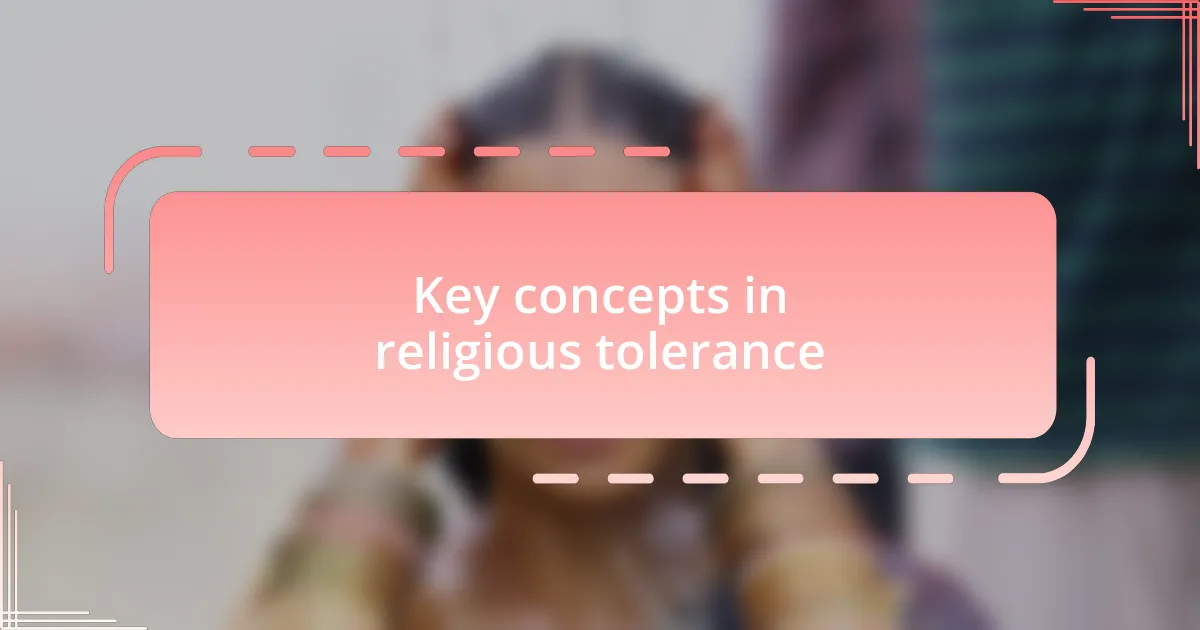
Key concepts in religious tolerance
One key concept in religious tolerance is respect for diversity. The first time I encountered someone from a different faith, I was struck by their passion and dedication. It made me realize that every tradition has its unique truths and values, and embracing these differences can significantly enrich our own understanding of the world. Have you ever considered how much you could learn from someone with different beliefs?
Another important aspect is the notion of coexistence. I once participated in a community event aimed at promoting interfaith dialogue. It was refreshing to see people coming together, sharing food and stories that highlighted our shared humanity. Moments like these remind me that despite our differences, we can find common ground, fostering a climate of peace instead of division. Isn’t it fascinating how simply being open to conversation can break down walls that divide us?
Lastly, the concept of empathy plays a vital role in religious tolerance. I vividly remember hearing a poignant story during a panel discussion—an individual’s account of losing a loved one to religious intolerance. It was a heavy moment that underscored the real-life consequences of prejudice. This experience resonated deeply with me; it’s a powerful reminder that our mission should be to understand each other’s experiences. How often do we stop to truly listen to one another’s stories? In doing so, we nurture an environment where everyone feels valued and accepted.
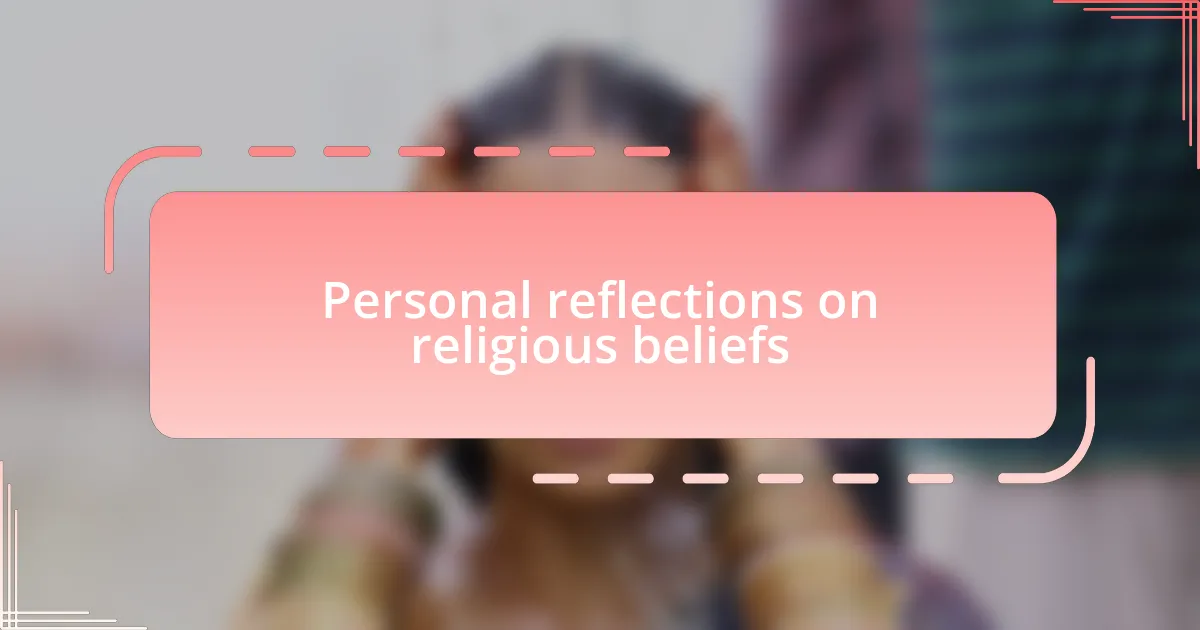
Personal reflections on religious beliefs
Reflecting on my own religious beliefs, I’ve often found that they shape my worldview in profound ways. For instance, I remember feeling a surge of belonging when I participated in a prayer service outside my faith tradition. It was an unexpected connection, reminding me that spirituality transcends individual practices. Have you ever felt drawn to something that doesn’t quite match your beliefs but still resonates deeply?
As I navigate the complexities of faith and belief, I’ve realized how important it is to recognize my own biases. There was a time when I held assumptions about a certain religious group based on stereotypes. However, after engaging in meaningful conversations with members of that community, I discovered that my previous notions were misguided. How often do we let preconceived ideas cloud our understanding of others?
Ultimately, the journey of understanding one’s beliefs is ongoing and often humbling. I recall sitting around a dinner table, where a spirited discussion on faith unfolded between friends with differing beliefs. Their insights challenged my own perceptions and broadened my understanding. It struck me then that these exchanges can be transformative, leading us to question, rethink, and reevaluate our own beliefs. Isn’t it incredible how much we can grow simply by opening ourselves up to dialogue?
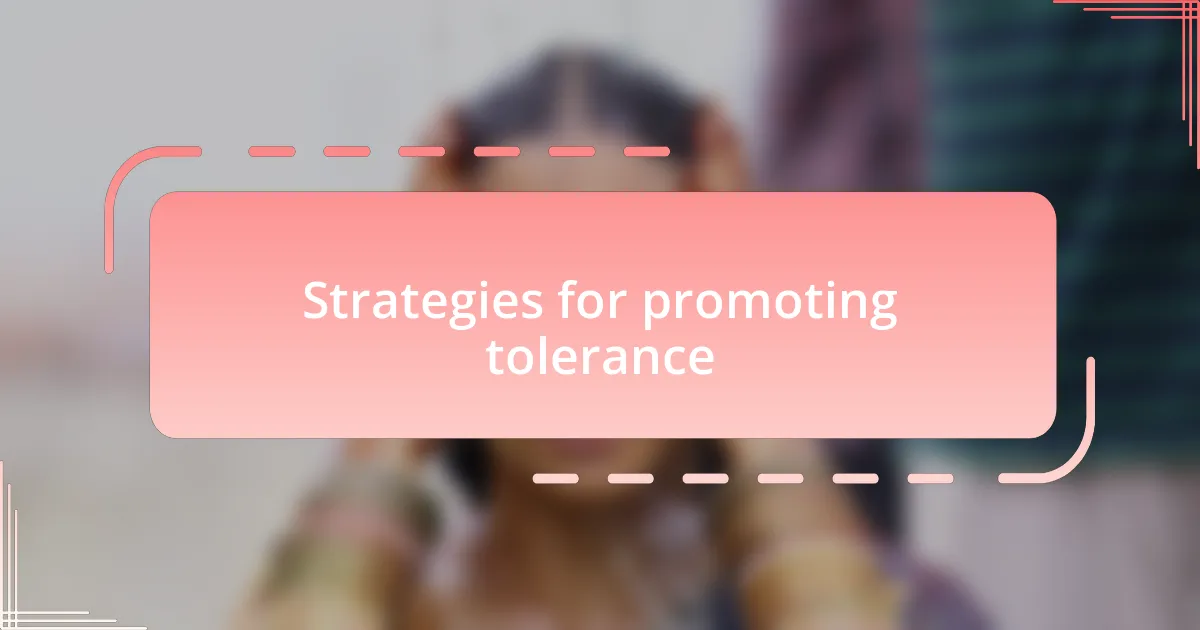
Strategies for promoting tolerance
One effective strategy for promoting tolerance is fostering open dialogues between different religious groups. I remember attending a workshop where people from various faiths shared their beliefs and challenges. The experience was eye-opening; it highlighted our common humanity amidst our distinct traditions. Have you ever noticed how easily conversations can dissolve misunderstandings?
In addition to dialogue, educational initiatives play a crucial role in promoting understanding. I once volunteered in a program that brought students of different backgrounds together to learn about each other’s cultures and beliefs. The exchanges that took place left a lasting impact on everyone involved, including me. There’s something powerful about learning firsthand—don’t you think it creates bonds that transcend superficial differences?
Additionally, encouraging community service projects that unite people from diverse faiths can foster tolerance effectively. I took part in a local initiative where people of various backgrounds collaborated to help the homeless. Working side by side, we realized that our shared goal was far greater than our individual beliefs. Isn’t it remarkable how collective efforts can shift perspectives and nurture empathy among us?